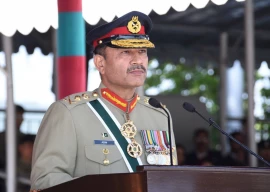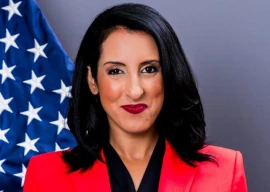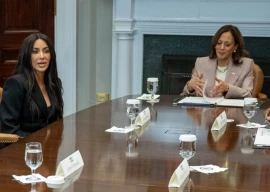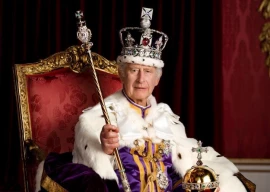
The economic damage is long term. Exports from Punjab factories have failed to reach Karachi for loading onto ships, which have had to leave empty. Foreign importers, who now have to scramble to fill their shelves, will begin to look for alternatives — and secure — supply sources. Pakistani exporters may face permanent loss of markets. After Karachi, the Lahore-Peshawar GT Road is the most important economic corridor. Karachi has been in turmoil for 29 years. Now, the Lahore-Peshawar corridor appears to be following suit.
An analysis of causative factors is in order. Pakistan has seen repeated political upheavals, including half a dozen martial laws and GHQ-inspired palace coups. The basic struggle is between the elite and the people. The elite are represented by the establishment and the people by (genuine) political parties — howsoever inefficiently and clumsily. Democracy, elections and political parties are instruments by which the people at large strive to acquire greater political space and a greater share of the economic pie — at the expense of the elite, of course. Understandably, the elite abhor democracy and elections and have continuously attempted to subvert political parties.
The establishment comprises the military and civil bureaucracy and the agricultural, industrial and the commercial, entrepreneurial and professional class. The vast bulk of this establishment is located in Punjab, with an appendix in Karachi. However, the epicentre of all anti-democratic thrusts has been in Punjab. Consequently, the establishment’s assault has been directed at pro-people forces: the PPP, NAP (now the ANP) and the Baloch nationalist parties, all of whom have their principal power bases outside Punjab. The PPP’s Punjab base among the working class has also suffered from the establishment’s repression.
The current crisis is of a different genre altogether and is largely an internal Punjab affair, with sections of the Punjabi elite pitted against one another. Under attack is the PML-N, with its power base almost exclusively in Punjab. The immediate crisis has been triggered by the policy conduct of the Nawaz government. Mention has been made of the closed family-based political decision-making process. Nawaz Sharif’s kitchen cabinet not only does not have anyone from Khyber-Pakhtunkhwa, Sindh or Balochistan, it excludes even key members of his own partymen from Punjab. This closed decision-making process extends to economic policy choices as well.
There is a deeper split, however. Punjab, particularly central Punjab, has a large and diverse entrepreneurial and professional elite. The thumping victory of the PML-N in Punjab raised expectations all year round for a share in the spoils. This expectation has been frustrated, over a period of the year, for a large section of the Punjabi elite. The failure of the government to address the power shortage problem, as promised, has turned off the urban entrepreneurial class.
A section of the Punjabi elite, once allied with the Ziaul Haq regime, also feels left out and betrayed by Nawaz Sharif. This appears particularly the case with respect to sharing the booty from privatisation. This section is also reported to have had policy papers prepared and individuals identified for possible inclusion in a long-term interim government. The beans to this effect have been spilled by expelled PTI President Javed Hashmi.
That the battle in Islamabad is a Punjab affair as indicated by the fact that there is not a single non-Punjabi front rank leader in the PML-N, the PTI or the Minhajul Quran. And the crowds sitting out the dharna are also largely from Punjab. Other provinces, as well as Gilgit-Baltistan and Azad Kashmir, are mere onlookers. They are still paying the political and economic cost of this conflict.
Debates in Parliament and the media have highlighted the impending damage to democracy from the present impasse. Little has been said of the possible damage to the country itself. The general election of 2013 has, for the first time, yielded a genuinely representative government in Balochistan. The assumption of office by a coalition led by a nationalist party has generated a serious debate in the province about the efficacy of democracy as a vehicle for obtaining provincial rights — as opposed to taking recourse to the gun. This debate draws upon the historic Eighteenth Amendment and the NFC Award as the institutional basis for positive change. The fact that Balochistan was able to hold local government elections without any disruption by the insurgents is evidence of the fact that all forces in the province are holding their fire — and their breath — in anticipation of the results of this democratic experiment. There is hope.
Any disruption of the democratic process at this stage will destroy that hope and break the already weak emotional link of the Baloch people with Pakistan. The section of the Ziaist Punjabi elite that has its eyes focused exclusively on their bank balances need to pause and consider the consequences of their power games on national integrity and survival. Dharna leaders also need to factor in this aspect in their political calculations.
Published in The Express Tribune, September 18th, 2014.
Like Opinion & Editorial on Facebook, follow @ETOpEd on Twitter to receive all updates on all our daily pieces.
COMMENTS (15)
Comments are moderated and generally will be posted if they are on-topic and not abusive.
For more information, please see our Comments FAQ



























1714024018-0/ModiLara-(1)1714024018-0-270x192.webp)









@Mirza: IK is Punjabi but I believe he is not promoting ethnicity. Ethnicity create divide when resources are shared with discrimination and without meritocracy. I grew-up in Karachi and felt the discrimination when I was not able to secure a professional job in the financial sector (state owned banks) just because I had urban domicile even though I had the right qualification.
The ethnic background is questioned when persons with authority promote a culture of nepotism and disregard merit. I with many other middle class families hope that IK will not pursue this kind of behaviour and that is why I am supporting PTI.
wow, this is disgusting! punjabi, baloch, sindhi, pathan, etc etc who cares? What I care about is are these people pro pakistan and pro awaam.
While I am not in favour of the current protest by PTI and PAT, this piece is surprising for the writer's audacity. He calls PPP, NAP/ANP and the Baloch nationalists pro-people forces! Mashallah. And on the ethnic composition of PTI's leadership, perhaps the writer is not aware that Arif Alvi and Pervez Khatak are non-Punjabis, just to name two figures. Shirin Mazari (of whom I am no fan) is Baloch. The writer could have made an intelligent criticism had he talked about the party's lack of penetration in Sindh and Baluchistan but he had to play the usual Punjab card in sheer disregard of facts. Overall, instead of making a valid argument (and there can be several strong arguments against PTI's dharna politics), Mr. Bangali himself comes across as one of those people who never let facts stand in the way of making an argument!
To stop this country from being ruled by tiny elite or prevent it from disintegration, Make new administrative provinces and hold local government elections in those provinces.
KB will never say a word about MQM making the country hostage to their agendas and is unable to see us Puktoons in PTI ranks, you need to change the lens through which you are observing politics.
True to his sinister breed a Bengali would see sinister things even in all good things. This is the case with this Bengali. They say two Bengalis are one political party and three Bengalis are two political parties.
Asad Umar also hails from Karachi, though he was elected from Islamabad
The writer should suffer some loss of integrity on some of his comments here. PTI crowd is almost half half Punjabi and Pakhtun. It is not a punjabi affair at all and one visit to D Chowk reveals that clearly. Second,Dharna is in Islamabad. How does the KB relates that to the Punjab industrial hub of Faisalabad, Sialkot, Gujrat triangle? The reasons for loss of orders must be found elsewhere.
@Umer Noor: My point exactly.
look at the karachi dharna mr, bengali. there are people from ll walks of life belonging to all ethnicities. out o5 the 5 five negotiating team members asad umar is from karachi, arif alvi is urdu-speaking and Pervez khattak is from KPK. Out of 15 Pms of India 8 have been from UP, despite UP having 17% of India. I am an Urdu speaker but if democracy means rule of majority then given Punjab's population i.e.54% of Pakistan's we need to be realistic. Inspite of this PTI has numerous leaders that are up in the hierarchy and belong to the smaller provinces. Try to be realistic rather than biased in favor of a system that is on the edge of its life. FYI Imran Khan is a pathan by birth but has spent his life in Punjab. His mother was a tribal, and to this day he can only speak Urdu and English. Grow up Mr. Bengali, times have changed,
A fair, balanced and eye opening Op Ed by ET. Thanks for that. The writer is correct by pointing out the family feud among elites from Punjab. The arrogance of IK/Qadri duo knows no bounds. Even if we assume 2013 elections rigged still the Senate is elected prior to that and under Gen Mush's era. Yet these elites who have never worked in their lives for a living show total disdain toward the most imp institution Pakistani Senate. It is not surprising that IK/PTI has not much presence in Sindh, Baluchistan, GB and Kashmir. These smaller provinces and their elected leaders cannot and should not be ignored and respected if we want to keep Pakistan intact.
How about Arif Alvi and Pervez Khattak?
There may not be any non Punjabi leader among PTI/Qadri agitation but it does not matter what the leaders and people of other provinces think. ZAB was hanged despite all the non Punjabi judges of SC had dissented. Two non Punjabi judges were retired during the hearing and the Punjabi judges were given extension. Yet who cares what the people and leaders of smaller provinces think. Every time when a non Punjabi govt was overthrown the SC went with the usurper. The only time SC sided with PM was when NS was overthrown. I have presented the fact people can draw their own conclusions.
Nation should be thankful to the Punjabi elite for letting them continue to stay in Pakistan!